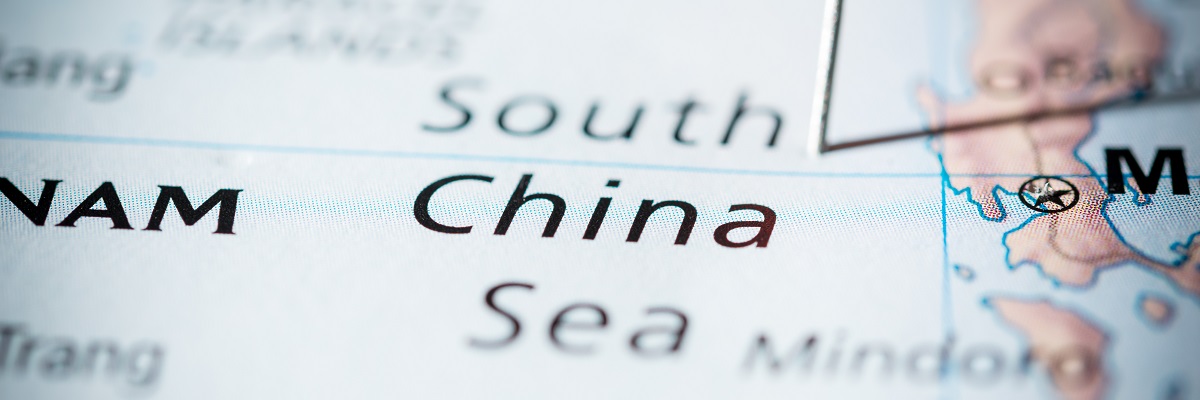Diplomacy
South China Sea: interpretations of international law, a tool for political influence?

Image Source : Shutterstock
Subscribe to our weekly newsletters for free
If you want to subscribe to World & New World Newsletter, please enter
your e-mail
Diplomacy

Image Source : Shutterstock
First Published in: Jan.17,2024
Feb.29, 2024
Renewed major tensions have surfaced once again in the South China Sea between China and the Philippines. While the immediate concern revolves around the control of reefs and islets, the underlying issue extends to the control of maritime territories, driving the parties involved. These sovereignty disputes are not novel occurrences. Conflicts in the South China Sea (SCS) have intensified since the 1960s, leading to a competition for the occupation of islands and islets in the Paracels and Spratlys. The objective was to establish control over these islands, using them as military outposts and symbols of sovereignty. With the introduction of the United Nations Convention on the Law of the Sea (UNCLOS), the rivalry transitioned towards the assertion of states' rights over maritime zones. The narrative of the parties involved has evolved regarding the legitimacy and legal characterization of the claimed maritime territories. Malaysia (1983), Vietnam (1994), and the Philippines (2009) have contended that the Spratly Islands do not merit an exclusive economic zone (EEZ), indirectly challenging China's claims. In response, Beijing has adjusted its official discourse. Is this shift in legal rhetoric a strategic reinterpretation of maritime law aimed at refuting adversaries' arguments and utilizing legal discourse as a political tool in a broader struggle for influence?
In the South China Sea (SCS), a noticeable shift in the redefinition of maritime boundaries has emerged since 2009. Previously, definitions often lacked clarity and legal grounding. In recent years, Malaysia, Brunei, Vietnam, and the Philippines have sought to refine their claims, aligning them with the norms established by the 1982 United Nations Convention on the Law of the Sea (UNCLOS). This strategic move sharply contrasts with the trajectory of the People's Republic of China (PRC), whose evolving stance has been criticized for increasingly diverging from international maritime law. Between 1994 and 2016, China's assertion over the Maritime Claims (MCS) primarily relied on the controversial nine-dash line [九段线], criticized for its ambiguity regarding the extent and legal basis of the claimed maritime territory. However, since 2016, following the ruling by the Permanent Court of Arbitration, China's discourse has shifted towards the "Four Sha" theory [四沙], positing that large (sometimes fictional) archipelagos serve as the legal foundation for its maritime claims. This shift among the Southeast Asian players could be seen as a strategic move vis-à-vis China: by refining their claims to align more closely with the principles of the Law of the Sea, these nations might aim to underscore the inherently unlawful and objectionable nature of China's assertions. This tactic underscores an increasing disparity between Southeast Asian states, endeavoring to adjust their claims in accordance with international legal norms, and China, whose assertions are grounded in disputed interpretations of maritime law.
The People's Republic of China (PRC) asserts its claim to the South China Sea (SCS) through what is commonly known as the nine-dash line (Fig. 1), a demarcation that has encompassed the majority of this maritime region since 1949.

However, significant ambiguity persists regarding the precise meaning and scope of this demarcation, as China has yet to provide a clear explanation despite repeated requests from neighboring states. This lack of transparency has led to frustration among neighboring nations, prompting the Philippines to file a formal complaint with the Law of the Sea Tribunal in April 2013. The Chinese government's reluctance to clarify the exact nature and coordinates of the line has fueled suspicions regarding its true intentions. Even Indonesia, which does not have territorial claims in the South China Sea, expressed concerns about the legal uncertainty surrounding China's delineation of this maritime boundary in 2010.
Before 2009, Southeast Asian countries involved in disputes over island formations or maritime zones in the South China Sea (SCS) had not clearly delineated their claims, either by providing legal justifications for their extensions or by publishing precise coordinates of the boundaries of the claimed maritime areas.
However, on May 6, 2009, Malaysia and Vietnam submitted a joint proposal for the extension of their continental shelves in the southern part of the SCS, followed by Vietnam's independent submission for the central part of the SCS on May 7. By doing so, they publicly disclosed the positions of the outer limits of their respective Exclusive Economic Zones (EEZs). Neither state included the island formations they claim in the SCS in the definition of their EEZs or extended continental shelves. Instead, the boundaries of the 200-mile zones are determined based on each state's coastline.
For instance, both Malaysia and Vietnam have excluded the Spratly Islands from the definition of their maritime zones, indicating that they consider these island formations as rocks under Article 121(3) of the United Nations Convention on the Law of the Sea (UNCLOS), which cannot generate either EEZs or continental shelves.
There has been a notable evolution in the discourse of Southeast Asian states involved in the South China Sea conflict – Vietnam, the Philippines, Malaysia, and even Indonesia, which is not directly embroiled in the dispute over sovereignty in the Spratly Islands – regarding the status of these islands and their capacity to generate maritime zones. Changes in interpretation, qualifications, or legal doctrines, as well as efforts to define international norms, can potentially be seen as a mobilization of law to achieve political objectives. When questioned about the evolution of legal analyses among the protagonists in Southeast Asia, a majority of the interviewed specialists (20 out of 25) noted a clear shift in the discourse of these four countries. There is a consensus that they seek alignment with the principles of the Law of the Sea. These states are exploiting ambiguities in Article 121 for political purposes: it involves waging "legal guerrilla warfare" and "legal diplomacy" to underscore China's divergent stance and, implicitly, its disregard for the spirit of UNCLOS. Chinese Response: Reassessing Island Groups in the South China Sea? On July 12, 2016, the Permanent Court of Arbitration in The Hague issued its ruling following the Philippines' claim filed in 2013. The Court's decision rebuffed Chinese assertions regarding historical rights and determined that none of the island formations in the Spratlys qualify as islands under Article 121, precluding them from generating an EEZ or continental shelf. China vehemently rejected this ruling, refusing to acknowledge the arbitration. However, Chinese rhetoric has shifted since 2016, indicating a willingness to adjust its arguments in light of the Court's findings. Before 2016, China asserted its sovereignty over the islands in the South China Sea without specifying the status of the Paracels or Spratlys island groups. However, since 2016, China has been advancing a new line of argumentation, grouping the island formations in the South China Sea into cohesive units. Chinese sovereignty is claimed to be derived from control over four blocks of islands forming coherent entities. It appears that Chinese legal experts are attempting to introduce a novel concept, as China cannot assert itself as an archipelagic State under UNCLOS. Such status would allow continental States to draw baselines around their archipelagos, which are considered territorial units. This concept faces significant challenge from numerous Western legal experts. Hence, in the Chinese narrative, there's a departure from discussing individual island groups or the ambiguous nine-dash line, towards emphasizing four archipelagos as the fundamental units of Chinese legal discourse. This shift, while sidestepping the PCA's 2016 ruling and distancing itself from the weakened concept of "island" due to the arbitration's denial of China's EEZ rights in the Spratlys, introduces the notion of archipelagos, purportedly enabling the creation of maritime zones in official discourse. However, this stance is dubious under the Law of the Sea, as it doesn't permit continental States to exploit the establishment of archipelagos outlined by lengthy baselines. Moreover, it doesn't authorize the generation of maritime zones from archipelagic entities if the islands constituting these archipelagos cannot themselves establish an EEZ or continental shelf.

In the South China Sea, there has been a notable shift in legal positions by both China and the Southeast Asian states. Vietnam, the Philippines, and Malaysia are now advancing the argument that the islets fail to meet the criteria outlined in Article 121(3), thus negating the establishment of an EEZ or continental shelf. This reclassification not only impacts their own claims but, more significantly, challenges China's assertion of expansive maritime territories under international law. This strategic maneuvering appears to signify a politicized manipulation of maritime legal frameworks. Conversely, China has also undergone doctrinal evolution, transitioning from conventional maritime claims rooted in the Paracels and Spratlys islands, to the historically contentious nine-dash line, and most recently, the emergence of the "Four Shas" concept, positing four coherent archipelagos as the basis for EEZs. This progression aims to establish a novel legal foundation to defend its ambitious territorial claims. In essence, these legal transformations underscore the instrumentalization of law as a means to advance and safeguard national interests, with China advocating for a distinct interpretation of international legal norms.
First published in :

"Frédéric Lasserre is a professor in the Department of Geography at Laval University in Quebec City (Canada). He heads the Conseil québécois d'Études géopolitiques (CQEG) and the Research Chair in Indo-Pacific Studies (CREIP). He is a member of Diploweb.com's Scientific Advisory Board. Frédéric Lasserre holds a Master's degree in Commerce (ESC Lyon), an MBA (York U.), a DEA in Geopolitics (U. Paris VIII) and a PhD in Geography (U. Saint-Étienne). He worked as a consultant at the Observatoire Européen de Géopolitique (OEG, Lyon) on the political and economic transformations of Central and Eastern Europe after the fall of the Berlin Wall, then as an international affairs advisor at the Quebec Ministry of Industry and Trade, and later at Investissement Québec. He has been a professor in the Department of Geography at Université Laval (Quebec) since 2001, and a researcher at the Institut québécois des Hautes études internationales (HEI) and the Institut Hydro-Québec en Environnement, Développement et Société (IEDS). He is also director of the Conseil québécois d'Études géopolitiques (CQEG) at HEI. He has conducted numerous research projects on water management and the Arctic. He coordinates a research team on the impact of climate change on Arctic governance, particularly with regard to navigation, natural resources and sovereignty disputes. His publications include Passages et mers arctiques. Géopolitique d'une région en mutation, published by Presses de l'Université du Québec in 2010. With his book L'éveil du dragon. Les défis du développement de la Chine au XXIe siècle (Presses de l'Université du Québec), he won the 2006 Prix du Meilleur livre d'Affaires."

Olga V. Alexeeva is a professor in the Department of History at the Université du Québec à Montréal (UQÀM) and a Senior Fellow at the China Institute, University of Alberta (Canada).
Unlock articles by signing up or logging in.
Become a member for unrestricted reading!